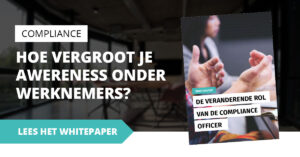Continuous compliance undermined by ‘exam syndrome’
Blog / News | 29-06-20
Studying diligently or the quick-and-dirty approach: exams are still snapshots
In business, employees have to take tests and exams all the time. Integrity tests, compliance exams, awareness exams, or tests as part of lifelong learning programs. These tests and exams often come along once a year and the vast majority of staff will take and pass them. You can then check the box and forget about it for a year because you have your house in order on paper. But did you know that positive exam results are merely false positives? Learn more about ‘exam syndrome’.
Appearances are deceptive
Cramming through the night to get a pass on the exam. Sound familiar? Sure, it means studying hard for an evening (or even a whole night), but you will have spent as little time as possible and still passed the exam, albeit only just. It is the kind of passing grade that feels like an A to many students, as you get the required result with as little effort as possible. Passing by the skin of your teeth is still passing. Isn’t it?
Sure, we may be exaggerating a bit here, but this is still very close to reality. This really is how many people approach an exam, and that includes employees. Needless to say, this approach does not yield the desired result. The knowledge that has been crammed in overnight will soon evaporate like a snowman in the desert. Up to 80% of new knowledge will disappear within a week if it is not repeated regularly – which is often the case with compliance exams. The exam is a snapshot of ephemeral knowledge and only creates a short-term feeling of having everything in order. These are mere appearances.
The feeling of having things in order also occurs with organizations with a tick-box culture. Read more about the tick-box culture here.
A for effort
There will always be employees who do put in the effort. They will have studied for more than just a few hours on the eve of the exam. This is what you want, of course, but does it also mean that they do retain the material after having passed the exam? Chances are that they will not actively use the knowledge after the exam, meaning that it will fade rapidly. It is a case of A for effort, but no lasting guarantee for continuous compliance. A snapshot of ephemeral knowledge that soon starts to fade. That is ‘exam syndrome’.
No more cramming for hours
So, what does work? How do you anchor knowledge long term? Studies show that spaced learning and spaced repetition are the answer. Spaced learning is learning at short regular intervals. Not cramming for hours on the night before the exam, but regularly spending fifteen minutes to absorb some information. Spaced repetition is about retrieving and brushing up on knowledge. The more often the information is repeated, the more it is anchored in the brain, moving from the short-term to the long-term memory. Knowledge in the long-term memory is knowledge that people always have top of mind, all year round.
The power of repetition
Repeat, repeat, repeat. That’s the key to knowledge anchoring. It may sound time-consuming, but it needn’t be. Having ‘quick learning bursts’ in between other tasks has turned out to work the best. And for maximum effectiveness, these learning bursts should focus on information that someone has not yet mastered completely. Preferably online and anywhere, of course, so that employees can learn while waiting for a bus, riding the train, when a meeting ends early, or even while making a coffee. Turn all of these moments when time is normally wasted into short learning intermezzos and people will be up to date in no time.
From exam stress to longer-lasting learning
As you might expect, you are going to have to help employees get started. Luckily, there are tools that support this way of anchoring knowledge. These tools will automatically remind employees to brush up, so as to ensure they have the required knowledge top of mind the whole year round, and not just on the night before and the week after the exam. Smartphones, tablets, and laptops must all become learning tools, so that people can learn any time and anywhere, turning time they normally waste into a valuable learning session. If you then also make sure you can monitor employees’ progress and proficiency levels, tests may even not be necessary anymore. You will then know that your employees are up to date, and they will not have to hit the books for hours on end. No more exam stress, but long-lasting learning. This is a major step from a scraping pass to continuous compliance.
Do you want to read more about compliance? Click here to find our Dutch whitepaper about the changing role of compliance and the Compliance Officer.

